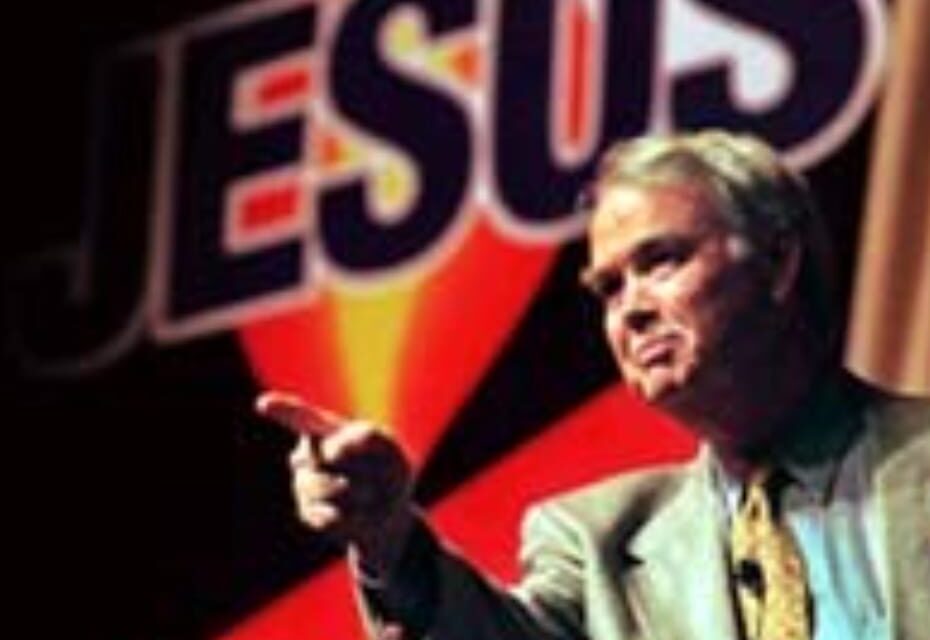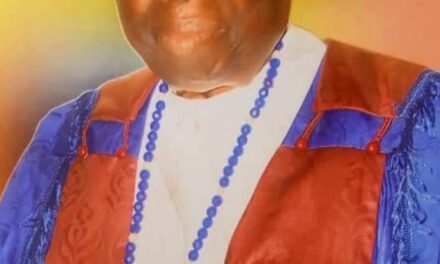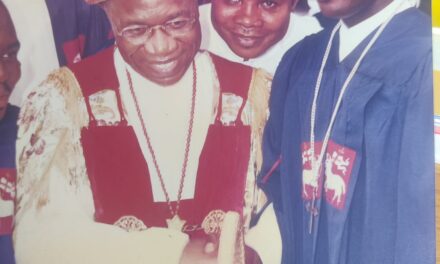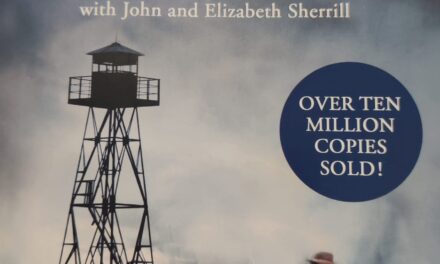We must take seriously the Great Commission, the spreading of the Gospel, and we must take seriously the Wesley claim, ‘the world is my parish – Eddie Fox
Methodism on Wednesday 28th July, 2021 lost one of its most missional encouragers and enablers of evangelism and church growth across the world, Rev Eddie Fox. Twenty eight years ago, at a time I was contemplating on my full-time calling into the ministry, Fox was a major evangelistic face of global Methodism I perceived through his traditional view of Scripture and Christian ethics, vibrant, alive, Spirit-filled, and missionally contagious. To the glory of God, I can testify that, I am one of the fruits of Fox’s World Methodist Evangelism/Cecil Williamson’s Ministry in Evangelism and Outreach to Nigeria in February, 1993. It was after this encounter that I finally yielded to my call in the Methodist ministry with my appointment in October 1993 as Conference Acting Editor, Methodist Church Nigeria (MCN). As one of the Open air revival interpreters during the February 1993 Fox’s/Cecil Williamson’s outreach in Nigeria, the vision of World Methodist Evangelism reawakened in me the Divine summon, identity, and mandate that the “people called Methodists,” followers of Christ Jesus in the company of the Wesleys, are being called and empowered by the Holy Spirit to “Offer Christ Today.”
The transition of Fox in such a time of Methodist’s membership decline calls for a renewing missional commitment as we celebrate the emergence of World Methodist Council (WMC) 140 years ago and World Methodist Evangelism (WME) 50 years ago. Fox’s transition as the evangelistic face of global Methodism calls for Methodist’s solemn assembly as we ask ourselves some missional questions about our future:[1] Are we repeating 1852 conflict and tension over Methodist understanding of holiness and doctrine of entire sanctification? Is the history of Methodist theology becoming a story of a fall from perfection of a Wesleyan Eden into a world of theological, ethics and moral defection? Are we experiencing the loss of theological truth and scriptural holiness through our wilful distortion, redefinition, secularism, prideful or deliberate desertion?[2] Fox’s transition calls global Methodism to return to the holy faith of our fathers.
As the World Director of Evangelism for the WMC, Fox co-edited with Dr George Morris the worldwide best-sellers Faith Sharing and Faith Sharing New Testament with the Psalms.[3] The book not only provides ‘basic advice about how to share the Christian faith,’ in cooperation with National indigenous Methodist Churches, WME, have published the “Basics of Christian Conversion and the Essentials for Leading a Person to Christ in over 50 different languages across the continents. Another best classic selling book by Fox and Morris, Let the Redeemed of the Lord Say So! helps to erase the fears of inadequate witnessing by giving confidence to Christian to effectively communicate the Gospel especially when a new millennium was dawning. Fox remains an evangelistic face to World Methodism with reference to his classics and legacies on how to share Christian faith. Fox lives on as his writings and books continue to empower humble ‘individuals who long to be effective witnesses, for congregations who have a desire to reach people and grow, and for college and seminary classes that are designed to motivate and inspire witnessing.’ Prior to his ministry and service with the WME, Fox was the Executive for Evangelism of the United Methodist Church (UMC). Bishop Ivan Abrahams, General Secretary of WMC aptly described Fox’s life as ‘a Testament to Wesley’s dictum for mission that held together holiness that knew no separation from social holiness.’[4]
The age of Methodism origin was one of spiritual and moral darkness. According to the 1881 Ecumenical Methodist Conference Proceedings, ‘England in the early part of 18th century had largely lapsed into infidelity. Ministers even in the pulpit cast doubts upon the truth of the Bible,’ thereby bringing ‘discredit on the sacred desk.’[5] Immorality was rampant coupled with ‘the blindness and inelasticity of the Anglican Church in the eighteenth century.’[6] Under these decays and declines, Methodism started as societies gathering without church edifices and without regular pastors. They met together singing, praying with mutual exhortation until increasing numbers and means enabled them to erect a humble building and to establish a congregation. Early Methodism grew ‘because there was unoccupied territory’ and souls. They grew because Christ had given to them “spirit and life.”[7] Just as Christianity was disparaged, Methodism was disparaged, hence it had divisions and its early disintegration and decline was predicted.[8]
John Wesley’s clear theology and spiritual patterns,[9] statements, sermons, and the doctrinal character of the hymns constantly sung, aided the growth, spiritual formation, and in keeping Methodist one. Methodism, in the beginning was with One heart, One faith. Missionally, all over the world Methodist theology/spirituality[10] is a (Bible based) faith unit. In the beginning, Wesley’s societies were independent but at the formation of a Conference, they were united and Wesley greatly rejoice. Wesley wrote in 1764, “I have long desired that there might be an open, avowed union between all who preach those fundamental truths – original sin, and justification by faith, producing inward and outward holiness.”[11] The establishment of a Pan-Anglican Congress (from June 15 to June 24, 1908), Pan-Presbyterian Council, and in 1881, Methodist Ecumenical Conference points to the fact that Wesley’s heart was a hundred years in advance of the Christian world.
In order to abide and remain faithful to Wesley’s ‘Catholic Spirit’ of one in warmed hearts and one in mission towards the spirit of heavenly mindedness,[12] the first session of Ecumenical Methodist Conference (EMC) was held in the City Road, Wesleyan Chapel, London on Wednesday, the 7th September, 1881. The Opening Service with some 400 delegates from 30 Methodist bodies around the world was conducted by the Rev George Osborn, D.D., President of the British Wesleyan Conference. In the spirit of Wesley, beyond a union of outward order, EMC ‘evinces a yearning for closer union’ for mission and scriptural holiness. World Methodist conferences were held every ten years until 1931 when ‘a decision was made to organize a Council – a new agency to express the common ideals and objectives of worldwide Methodism.’ The stability of the Conference was affected by World War II until 1951 Conference, when ‘two decisions were taken to ensure the stability of the conferences: 1) that the name be changed to the World Methodist Council; 2) that the Council should meet at five-year intervals.’
Today, the WMC is linked to 80 Wesleyan/Methodist church groups on six continents, including Methodist Church in Britain and Methodist Church Nigeria. Rev E. E. Jenkins from the British Wesleyan Church was the first President. Among other past Presidents were Rev W. T Davidson, Wesleyan Methodist Church, 1901; Rev John E Wakerley, Wesleyan Methodist Church, 1921; Rev Luke Wiseman, Wesleyan Methodist Church, 1931; Rev Wilbert F. Howard, Wesleyan Methodist Church, 1947; Rev Dr Harold Roberts, British Methodist Church, 1956-1961; Rev Dr Kenneth Greet, British Methodist Church, 1976-1981; Rev Dr Donald English, British Methodist Church, 1991-1996; His Eminence Dr Sunday Mbang, Methodist Church Nigeria, 2001-2006; Rev Dr John C. A. Barett, British Methodist Church, 2006-2011. The current President is Rev Dr Jong Chun “J. C.” Park (2016 till date) while the General Secretary is Bishop Ivan M Abrahams (2012 till date). The WMC is grouped under different committees for effective coordination, namely: Ecumenical relationships, Education, Evangelism, Family life, Inter-religious relationships, Social and International Affairs, Theological education, Worship and Liturgy, and Youth and Young Adult.
WME under the WMC begun in 1971 ‘to bring together over 84 million Christians in over 134 countries within the wide range of Methodist Wesleyan traditions.’[13] In 1971 at Denver, Colorado United State of America, the WME was launched when the WMC declares: “It is time for all the people called Methodists to go on World Mission and Evangelism together! We believe that the Lord Jesus Christ’s Commission to His Church to preach the Gospel and to make Disciples is the supreme business of the Church. God through the Holy Spirit is calling the Methodist people everywhere to a strengthened and sustained thrust in world mission and evangelism.” As past of their vision to raise up a new generation of faithful evangelism leaders around the world, ‘during the 1970′s, leaders in the World Evangelism movement began envisioning an institute … At the WMC’s meeting in Honolulu, Hawaii in July, 1981 the WME Institute was established as a ministry of World Evangelism, World Methodist Council and Candler School of Theology, Emory University, Atlanta, Georgia. For over thirty years now, the World Methodist Evangelism Institute has worked to broaden and connect pan-Methodist leaders through its seminars.’
In 1974, Worldwide Conferences on Evangelism were held in every region and continent. Africa – Ghana; Asia:
India and Singapore
Australia, Caribbean
and Americas – Bahamas; Europe –
Switzerland; South America – Brazil;
North America – USA. In the same years,
the World Methodist Convocation on Evangelism was held in Jerusalem with ‘over 3,000 Methodists gather in Shepherd’s Field near
Bethlehem to commit themselves to spreading the same good news which the angels
declared to the shepherds, “A Savior is born.”[14]
The main goal of WME is ‘to emphasize and facilitate the sharing of the gospel by the council’s churches.’ WME vision and work ‘grew out of the belief that preaching the Gospel and making disciples of Jesus Christ is the supreme business of the Church.’ Fifty years after its formation, WME remains ‘a connection point for Christians within the global Wesleyan family who are dedicated to becoming channels of transformation through the power of God’s Holy Spirit.’ The pioneer World Director of WME from 1978 – 1988 was Sir Alan Walker. He was ‘a distinguished church and national leader from Sydney, Australia. Walker laid a good foundation with ‘the first International Christian Youth Conference on Evangelism in Truro, England in 1980.’ The second International Christian Youth Conference on Evangelism was held in Nassau, Bahamas in 1983. Other subsequent conferences continue to have ‘profound impact on Wesleyan Methodist leaders worldwide.’ In 1987, Regional Secretaries were selected to advance the work of WME throughout the world and gathered for their first world meeting.
Fox was the second Director of the WME and the current Executive Director is Dr. Kimberly Reisman. Among Fox’s early successes and testimonies about WME was that ‘the Berlin Wall fell and Christians in Eastern Europe were no longer compelled to practice their faith in secret. Suddenly houses and meeting spaces were overflowing as Christ followers in the Wesleyan family began sharing their experience of faith. Recognizing the need to stand alongside brothers and sisters in Eastern Europe, Eddie enlisted generous partners to engage in the new birth of congregations in then-Czechoslovakia. Soon “Connecting Congregation” relationships sprouted in Estonia, Poland, Latvia, and Bulgaria.’[15]
Fox, an ordained United Methodist elder in the Holston Conference, died at age 83, after having been in hospice care in his hometown of Sevierville, Tennessee. Fox grew up attending a Methodist church on Waldens Creek in Sevier County, in the Appalachian foothills of East Tennessee. His Methodist roots were deep. At age 9, he committed his life to Christ, and by age 17, he was licensed to preach. A top student at Emory University’s Candler School of Theology, after his ordination, Fox served churches in Virginia and Tennessee before joining the Board of Evangelism, now known as United Methodist Discipleship Ministries. Fox served a quarter century, 1989 to 2014 as Executive Director of WME, and travelled the world empowering leaders across the world to be able to impact their countries on behalf of Jesus Christ. At his commissioning, Fox declared, “We must take seriously the Great Commission, the spreading of the Gospel, and we must take seriously the Wesley claim, ‘the world is my parish.”[16]
Fox’s tenure coincided with the fall of communism in Eastern Europe and presented opportunities for churches there to revive or begin. As a top student at Emory University’s Candler School of Theology, Fox was ordained as an elder in the Holston Conference, and served churches in Virginia and Tennessee. Eddie Fox became synonymous with Methodist evangelism over a long career of sharing the gospel worldwide. Fox created a legacy that is large and lasting ‘delivering bicycles to Cuban pastors, helping local churches in Eastern Europe begin or revive after communism collapsed there, creating a New Testament edition designed for effective witnessing or finding innovative ways for the World Methodist Evangelism organization to do its work.’ According to a retired United Methodist Bishop Robert Fannin “I never have seen anyone have the impact that Eddie had on the world, in terms of faith.” Fox as the director of WME worked with the Rev. Winston Worrell who was then the director of the World Evangelism Institute, a ministry of Emory University and the WMC. According to Worrell “I worked with Eddie for over 20 years, and I learned so much from him …Methodism has lost a great leader.” Before he was named to lead World Methodist Evangelism in 1989, Fox was on the ‘faculty of the Billy Graham School of Evangelism for 15 years beginning in the mid-1980s.’ According to Fox, it was Billy Graham who let him ‘know
that God had chosen me for this moment and that he was praying for me.” Graham died in 2018.
In 1990, Mikhail Gorbachev was awarded the World Methodist Peace Prize from the World Methodist Council. Gorbachev ‘received the award for his creativity as a catalyst influencing massive global changes through new international initiatives, including the introduction of “glasnost” to the world, and for his work to free religious bodies in the U.S.S.R. from laws restricting the free exercise of religion, Mikhail Gorbachev became the third non-Methodist to receive the Peace Award. He reinforced persuasively the notion that dialogue is always preferable to war. He was cited for his contributions to human understanding, international stability, and a changing world.’ Dr. Maxie Dunnam, Chair of WME at the time, along with Bishop Sundo Kim, then WME Regional Secretary in Asia attended a meeting where Bishop Kim closed the gathering by praying for Gorbachev.’
On the legacy of Fox, Joe Hale, General Secretary, WMC (1976-2001) said in 1996 during the 25th anniversary of WME, “The ‘wide-opening door’ about which Dr. Eddie Fox often speaks, is a window through which we are seeing the emergence of new congregations, new life, and new hope! When we look at World Evangelism, we can only stand back and say, ‘This is the Lord’s doing, and it is marvellous in our sight.’”[17] Fox’s new initiatives enhanced the establishment of ‘significant ministries that have impacted Christ followers and leaders worldwide, including the Connecting Congregation ministry.
In 1996, during the 25th anniversary of WME, a missional instrument and approach to evangelism, Christian spiritual formation, and leadership called Order of the Flame was established by Fox. FLAME stands for Faithful Leaders As Mission Evangelists. This gathering of FLAME a covenant communities mainly of young clergy and their spouses committed to evangelism at North America have been formed in Africa and Ireland. According to Reisman, Fox “encouraged young pastors to see themselves as mission evangelists … assigned not just to their local church but to their whole community.” Fox’s global mileage extended to Cuba in 2002, where he delivered ‘400 bicycles to missionary lay pastors of the Methodist Church in Cuba.’ Fox said, “I want to give them wheels so they can go faster and do more for the Lord,” in 1998, Fox met and presented the South African leader, Nelson Mandela ‘an award from World Methodist Evangelism.’ In 2013, Fox, based on his traditional view of Scripture and Christian ethics was honoured
by Candler School of Theology with a Distinguished Alumni Award.
Fox’s legacy in World Evangelism across every continent continue to remain faithful and fruitful to the vision and to the ‘key strategic areas of ministry: Connecting Congregations in Christ; Multiplying the Witnesses of Christ; Training Leaders in Evangelism; Developing Resources for Evangelism; To see the Methodist Movement alive, vibrant, growing and yearning to spread the good news of Christ Jesus throughout the whole world through word, deed and sign.’ In February 1993, Fox and the World Methodist Evangelism team came to Nigeria to partner with Methodist Church Nigeria on evangelism. There was a wind of revival for renewal and commitment to God’s mission after the Nigerian Civil War from the beginning of the decades of the 70s. The evangelically minded Methodists shared and lived their vision of an evangelical Methodist Church. The second half of the decade into the 80s witnessed the springing up of evangelical groups with the local churches for nurture, witness and for intercessory ministry to heal and bind the wounds of the Methodist crisis.[18] In November 1985, Nigerian Methodist evangelicals met at Jesus College, Otukpo and this lead to the formation of national front in the church known as National Congress of Evangelising Methodist (NACEM). NACEM was formally inaugurated in February, 1986 to enhance and coordinate the work of evangelism in the church. NACEM’s all-embracing meeting with other concerned Methodist evangelical leaders as advised by the 1988 Conference of Methodist Church Nigeria led to the emergence of Methodist Evangelical Movement (MEM) at the 1989 Conference. After the re-unification and ratification of the Methodist New Constitution on May 24th, 1990, a full-time Director of Evangelism was appointed with effect from the 1st of August, 1990.
At a time when the Department of Evangelism, Methodist Church Nigeria with Most Rev Dr Joseph Sunday Ajayi as the Director was still trying to find its missional bearing, Fox’s World Methodist Evangelism in partnership with Cecil Williamson team came as God’s sent and were supported by Nigerian Methodists leadership, especially His Eminence Sunday Mbang, Arcbishop Amos Omodunbi, Archbishop Ayo Ladigbolu, Very Rev Dr Mike Oye, Rev Dr Oladele, Bro Fakolade, J K Udensi, Arch Paul Udenyi. Fox’s World Methodist Evangelism and Cecil Williamson’s ministry empowered and equipped the Evangelism department, connected dioceses, circuits, congregations, multiplied the Witnesses of Christ, trained the lay and ministerial leaders, provided equipment and resources for evangelism. New churches were planted across Nigeria and many youth were brought back to Methodism in Nigeria. Fox , the evangelistic face of World Methodist Council at 140 and World Methodist Evangelism at 50 reminds us that the future of Methodism, tracing the early source of its power and growth will continue to depend upon loving obedience and careful study of God’s Word in the family altar, Sunday School, and church societies.[19] In a time of theological and political divisions and transitions, Fox’s transition as the evangelistic face of Methodism summons us to repent and stop watering down Methodism’s core theological commitments.
Please let us
remember Fox’s wife and their three grown children and six grandchildren in
prayer. In a time like this, when neutral humanistic attitude and inclusiveness
is growing, let us pray for the WMC and WME for renewal, boldness, and unction
to function in this world as our parish Jesus’ name.
[1] Stuckey, Tom, Singing the Lord’s Song in a Strange Land: The Future of the Church in Britain: A Methodist Perspective (Suffolk: Church in the Market Place Publications, 2017), pp. 60-94
[2] Chiles, Robert E, Theological Transition in America Methodism (Lanham,MD: University Press of America, 1983), pp. 13-15
[3] Fox, H Eddie; Morris, George E (eds), The Faith-Sharing New Testament with the Psalms (Nashville, TN, Cokesbury,1996) p. ii
[4] https://worldmethodistcouncil.org/2021/07/29/world-methodist-council-mourns-the-passing-of-eddie-fox/
[5] Ward, C. D.; Walden, J. M.; Perks, R. W.; McFerrin, J. B. (eds), Ecumenical Methodist Conference, “1881 Proceedings of the Ecumenical Methodist Conference” (Nashville, Tenn.: Southern Methodist Publishing House, 1882), p. 15, https://place.asburyseminary.edu/cgi/viewcontent.cgi?article=1007&context=wmcproceedings
[6] Workman, H. B. Methodism (Cambridge: University Press, 1912), p. 15
[7] Ward.; Walden,.; Perks,; McFerrin, (eds), Ecumenical Methodist Conference, “1881 Proceedings of the Ecumenical Methodist Conference”, pp. 16-17
[8] Okegbile, Deji, Stop the Funeral: Reverse Methodists Decline ( A Prayer Guide) ( London: Supertec, 2017), pp. 9-15
[9] Wainwright, Geoffrey, Methodists in Dialog (Nashville,TN: Kingswood Books, 1995), pp. 97-104
[10] Bondi, Roberta C, ‘Aldersgate and Patterns of Methodist Spirituality’ in Maddox, Randy, L. (ed), Aldersgate Reconsidered (Nashville, TN, Kingswood Books, 1990), pp. 21-32
[11] Ward.; Walden,.; Perks,; McFerrin, (eds), Ecumenical Methodist Conference, “1881 Proceedings of the Ecumenical Methodist Conference”, p. 17
[12] Richey, Russell E,; Campbell, Dennis M, Lawrence, William B, (eds), Connectionalism: Ecclesiology, Mission, and Identity (Nashville: Abingdon Press, 1997), p. 30
[13] https://worldmethodist.org/our-story/
[14] https://worldmethodist.org/50th-anniversary/
[15] https://worldmethodist.org/our-story/
[16] https://worldmethodist.org/50th-anniversary/
[17] https://worldmethodist.org/50th-anniversary/
[18] Methodist Church Nigeria, Department of Evangelism, Methodist Evangelical Movement (MEM) Constitution, 1994, p. 4
[19] Ward.; Walden,.; Perks,; McFerrin, (eds), Ecumenical Methodist Conference, “1881 Proceedings of the Ecumenical Methodist Conference”, p. 18











Recent Comments